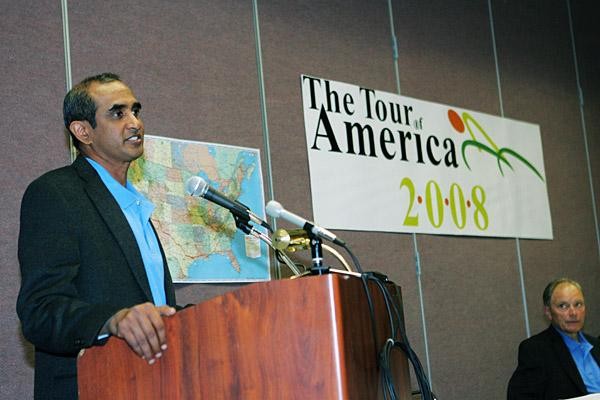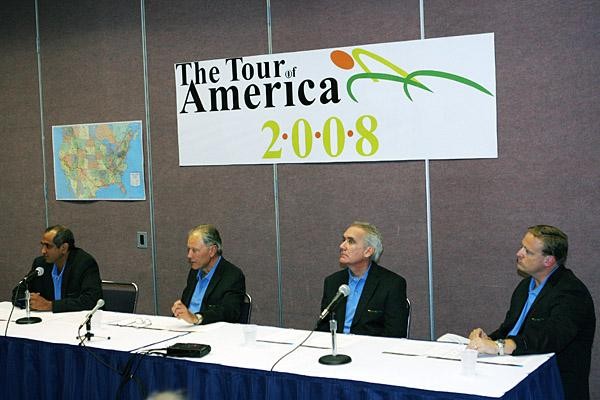Tour of America faces harsh criticism, in theory
The management behind the recently announced Tour of America, a proposed four-week, 27 stage and...


News feature , September 29, 2007
The management behind the recently announced Tour of America, a proposed four-week, 27 stage and 7,000-plus kilometer race in September of 2008 from New York to San Francisco for $11 million in prize money, held a press conference at the Interbike trade show on Thursday to discuss the details of the race. While the main protagonist behind the race idea, Dr. Frank Arokiasamy, Ph.D., exuded confidence throughout the presentation, the assembled media and other interested parties took turns shooting gaping holes through the loosely gathered plans, and coming away with more questions than when they entered.
Upon entering the room, the press corps was handed a three-page information packet with mostly vague details about the race organization, but shockingly detailed information about the entire 27 stages of the race, including both start and finish cities along with dates.
An announcer introduced Arokiasamy, a former economics professor and corporate consultant, as the Tour Director, as well as Richard Dunn and David Mayer-Oakes as race directors. Both Dunn and Mayer-Oakes are former US national team members, with Mayer-Oakes a former junior world champion. After a short opening statement by Arokiasamy, the floor was opened to questions -- of which there were many.
Arokiasamy explained that for him, this race is a dream that he wants to turn into a reality -- and he believes it will solve the problems that the sport of cycling is suffering from worldwide. "We believe that cycling needs it. We feel America needs it, and cycling has been inundated with bad press," he said, citing the doping scandals as an example.
What ensued was a veritable dressing-down of Arokiasamy, a self-confessed cycling novice, as well as the proposed race. The end result of this was that anything that seemed to be in place was now in question. "Everything on the event sheet is open to change, the distances... the cities -- this is a framework," said Arokiasamy after wavering on many questions throughout the conference.
One area that received a lot of attention was the proposed course, with four stages of more than 400 kilometers each and an individual time trial of nearly 130 kilometers. The question of if the race was possible for a someone to even complete, let alone compete in, were asked. As well, the irony of such an extreme race - one that is meant to solve the problems doping scandals have caused - possibly causing riders to turn to performance enhancing substances was also mentioned.
Get The Leadout Newsletter
The latest race content, interviews, features, reviews and expert buying guides, direct to your inbox!
To this, Arokiasamy turned to Dunn for assistance. "Some of us think it is a little aggressive and we will be trimming down the length of stages to make everyone happy," he said. "We will be making adjustments to the stages; we realize they are a bit long for how we have it in our original proposal. The overall length of the race will shorten a bit. We definitely plan to test all the riders, and it's one of my concerns that the longer and harder the race is, the more likely a rider can make a mistake and turn to performance enhancing drugs. We do plan to trim it down and do a lot of testing."
To this area of questioning, Arokiasamy also answered that the financial backing is tied to the length of the race. "If we trim this down too much, the corporate money is gone," he said. "We talked about doing a smaller race, but our financial backers said no. If we do a seven day stage race, there is no $11 million prize. That is a reality. The only way we have it is if we do something really ambitious. I hope that the prize will entice a T-Mobile or an Astana."
Speaking of finances, another obvious line of questions were directed at the proposed $30 million budget and $11 million prize purse. Arokiasamy confidently said his experience in the corporate world would allow him to raise the money, though he admitted no money has been raised as of yet. "We have not put anything on a dotted line, but I am in negotiations with several companies and I hope to have much of that very soon," he said.
When pressed for a schedule, he said, "By October 31, we should have 20 million locked up."
A reasonable follow-up question was how much Arokiasamy was asking for a title sponsor, to which he replied, "We won't have a title sponsor. We will have 27 event sponsors, so that when we lose people, it is not a disaster."
Beyond the money issue, the lack of logistics and local governmental support was glaring. From what Arokiasamy said, it seemed that none of the start or finish cities had signed-on to host the race, let alone any municipalities through which the race will have to travel. "We hope to have a final route by mid-March with all the cities signed-up," said Arokiasamy. "We are in negotiations with several cities and will be doing so in phases because we cannot talk to all 500 at one time. We are going to start with the major cities and then connect the dots as we go."
In the audience and asking questions was John Eustice, a veteran of both US racing and race promoting. Eustice is someone who knows how difficult it is to put on a one day race like the Univest Grand Prix, and sounded astonished that anyone would propose a race of this magnitude without serious thought into the technical aspects, such as the fact that almost the entire proposed direction of the race course will be into a headwind or that the UCI would never sanction a race like this.
Yet another audience member asked if Arokiasamy was aware that ProTour teams like the two he mentioned wanting to have race, T-Mobile and Astana, would be unable to race a non-sanctioned UCI race. Arokiasamy's response was confusing, possibly showing his lack of cycling knowledge. "We are not talking about UCI sanctions for year one, we are talking about USA Cycling sanctions." He also said the plan was to entice teams to race with the $11 million. "Richard's first reaction was that the best cyclists won't come, and they never really have. That is why I think we need something really grandiose. When you look at the prizes, they are overboard and overkill. And they are intended to be that, to be 'wow!'"
Overall, Arokiasamy responded to this and other questions in much the same way. "I am not a cycling guy, Richard and David are," he said. "They are the ones that are going to pare it down and make it more acceptable and manageable."
"I am just a very optimistic guy, and I've done things in the corporate world... setting up whole distribution networks for all over the world... I've never done event management. I know what I can do, and I know what I can't -- and I don't try to do the things I can't."
With the lion's share of the race still floating in theoretical limbo, the question of why the group decided to announce now was asked. "I had spoken to another PR firm and they strongly suggested that I do not announce this yet," Arokiasamy responded. "We talked about it and decided it was time to announce it preliminary. It would be really nice to have the mayor of New York and the mayor of San Francisco on each side and the CEOs of several major companies backing. It would be irresponsible of us to come to you in March and say we have this huge event in September."
"The cycling world dictates when we do the announcement," he said. "There is still a lot of work to do, and we hope the people with the technical expertise will come to us and say, 'You guys need to do this, you guys need to do that.' There are changes that need to be made, and that is obvious from talking to you. We welcome the discussion."
Near the end, Arokiasamy admitted that the possibility of the race not happening next year has crossed his mind. "We are very realistic about this not happening in 2008; we have a cut-off date of March 31," he said. "If it needs to move to 2009, we will do that."
However, one thing was certain throughout the entire press conference -- Arokiasamy still believes this race is going to happen next year.
"I will make this happen, I will bring the $30 million of corporate money. There is a plan in place. We are pleasantly encouraged with the response we have gotten."